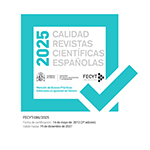The composiciones for foreigners in New Spain, 1595–1700
Abstract
In the early 1590s, Philip II of Spain recognized that the royal treasury was exhausted. In an effort to recoup monetary resources, he imposed several taxes in the American viceroyalties. One of them was the composición (settlement) for foreigners. The composición has been interpreted as a way of legalization and regularization of illegal foreigners. We argue instead that composición was a penalty, executed by the king in order to distribute Royal Patronage. We analyze its origins and transformations, as well as the problems experienced by the king’s servants, and the solutions they found for its application in Mexico between 1595 and 1694. Finally, we examine how the composición was received and the impact it had on foreigners.Downloads
Article download
License
In order to support the global exchange of knowledge, the journal Cuadernos de Historia Moderna is allowing unrestricted access to its content as from its publication in this electronic edition, and as such it is an open-access journal. The originals published in this journal are the property of the Complutense University of Madrid and any reproduction thereof in full or in part must cite the source. All content is distributed under a Creative Commons Attribution 4.0 use and distribution licence (CC BY 4.0). This circumstance must be expressly stated in these terms where necessary. You can view the summary and the complete legal text of the licence.












